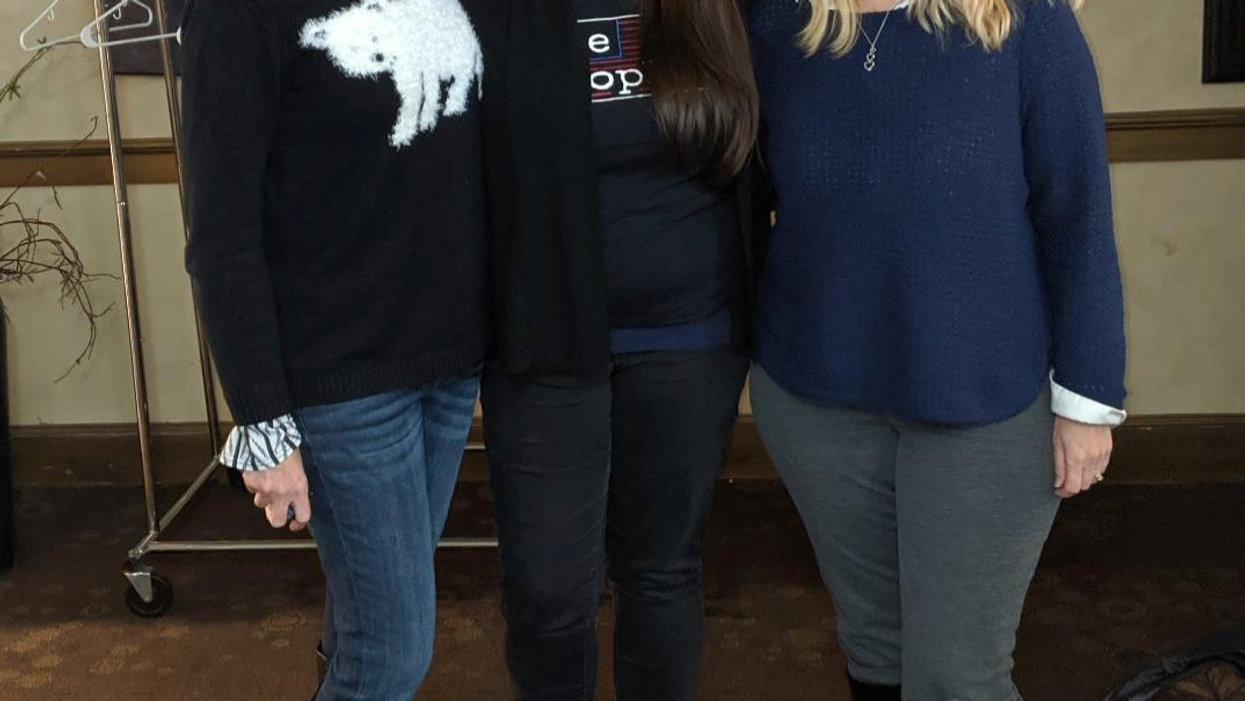Having organized last year's grassroots movement ending Michigan's politicized gerrymandering, Fahey is now executive director of The People, which is forming statewide networks to promote government accountability. She interviews a colleague in the world of democracy reform each month for our Opinion section.
Lisa Nash, a Democrat who lost a close state House race last year, and former Republican state Rep. Terry Wolf are the dynamic force behind The People's incredible New Hampshire leadership team. They just pulled off a three-day, five-city statewide kickoff tour where we heard from some incredible Granite Staters of all stripes.
As the tour ended, I spoke with Lisa about our time on the road and about what it's like to be one of those people who jumps into action and helps her community regardless of anyone's personal politics.
Our recent conversation has been edited for clarity and brevity.
Fahey: How did you get involved with The People?
Nash: Last spring I was invited to an event in Manchester with Andrew Shue, who is now The People's board president, by my friend Terry Wolf. People attending were saying, "We're all feeling this divisiveness and gridlock in politics." It's so hyper-partisan that people are feeling left out altogether. Unless you're on the polar ends, you're not part of the conversation. I ran for state representative because I was feeling these very same things: increasing polarization, partisan gridlock, average people feeling left out, left behind and completely unheard. We need to get people back into politics. We need to get people pushing for changes.
Fahey: New Hampshire is proudly always the first state to host a presidential primary. Is it more polarized as a result?
Nash: We actually tend to be more open to political differences because of our place on the calendar. Our access to presidential candidates is fairly unique and often brings people from across the political spectrum into the same spaces. We also have a hardy, independent, New Englander attitude that resists being put in a narrow box.
Fahey: How has your life changed since getting more involved in politics?
Nash: I have learned there is no black and white. When you sit down and talk with someone, you can better understand them from a human perspective without using the lens of "party affiliation."
Fahey: Talk a bit about your role with The People?
Nash: With five events in three days, we are getting up and running! We're getting people in the room talking about what's happening in the country, what's happening in politics and how people feel about it. We have to start by building trust in order to have those conversations. And we have to let people know we're a welcoming place to talk. Otherwise it's really hard to find common ground, because people are going to retreat into their corners.
Fahey: How did you first meet Terry Wolf?
Nash: Our kids were in preschool and we were new moms. At the time, we didn't talk about politics, not directly. Through the years, as our kids got older, we started getting involved in local politics in our own ways. Our friendship never revolved around politics, but we always could talk openly with each other and respect each other's positions. We didn't always agree. I think that's the beauty of our friendship; as we grew and evolved and got more involved, a mutual respect was always there. Coming into The People to work together, we already knew that we can disagree and still like and respect each other and work together.
Fahey: That's inspiring. I look at my bipartisan friendships and it's not like they started with "Hi, I'm an independent." Or "Hi I'm a Republican. Let's be friends."
Nash: That is key to everything we're talking about. When you're cheering at your kids' soccer game or you're at a business meeting, nobody is asking about political backgrounds. But as soon as politics come up, it seems like defenses automatically go up. We've forgotten that we're all people first. How we identify politically is just a sliver of our identity. It's not the only part of who we are. Somehow, we've forgotten that. It's happened over the last generation. Something shifted.
Fahey: What steps are you taking to facilitate an environment where people can talk respectfully about politics?
Nash: We have invited, and want to have, all voices at the table. We're talking about what people see as the problems and ideas about fixing some of these things. We're not focused on, "What party are you from?" Whether you're a Republican or a Democrat, or if you identify outside of those parties, I think it is very limiting to put people in those boxes, especially right out of the gate.
Fahey: If you were speaking to a high school student or a new immigrant to the country, how would you describe what being an American means to you?
Nash: Two words: freedom and opportunity. We have the freedom to move about freely, to speak about our government, to choose our elected officials, to practice any religion and to protest. We have the opportunity of education and of working hard to move from one economic or social class to another. These ideals have been fought and sacrificed for, and being an American means we will continue to fight to uphold these values.
Fahey: Do you have a new year's resolution?
Nash: Watching the news can be overwhelmingly negative. But once in a while, you glimpse a story that gives you hope: The person who opens a bakery and hires homeless people, maybe, or the person who fixes old bicycles and gives them to people so that they have work transportation. I've been thinking about people that really inspire me. For the next year, I am focusing on doing things, even small things, that can have a positive impact on my community.




















